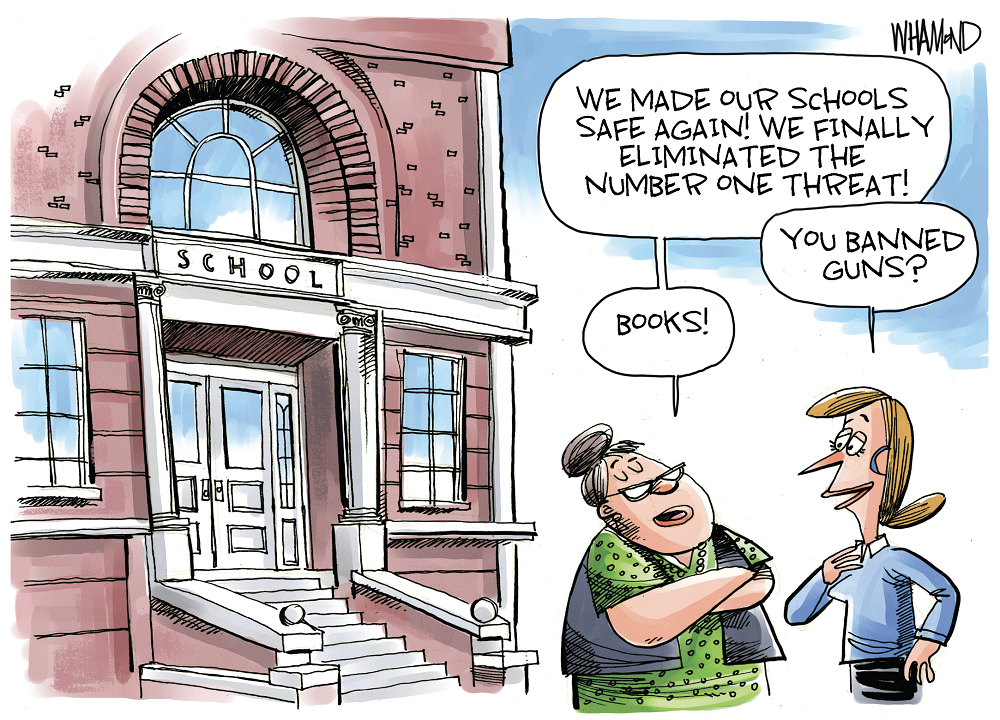CHURCH & STATE | Book Banners and the Growing War on the Freedom to Think

Books are in trouble in the United States. Books are being removed from public school curricula. Books are being banned. Books are being burned.
The recent wave of censorship in America is accompanied by a rise in a virulent form of Christian nationalism. This is no coincidence. Public schools, public libraries and indeed the right to learn and be educated have long been targets of the Religious Right.
The McMinn County, Tennessee, Board of Education captured national headlines in February when it removed Art Spiegelman’s Pulitzer Prize-winning graphic novel Maus from the curriculum. Board members insisted they acted because the book contains explicit language and nudity. Yes, some profanity does appear–the book is about the Holocaust, after all–but the only nudity is hardly sexualized; it’s a drawing of a dead character.
A few weeks prior to that, an incident in Virginia attracted less attention but was just as alarming. Two members of the Spotsylvania County Board of Education spoke openly about their desire to burn two LGBTQ-themed books they consider offensive–and they insisted that every book in their schools’ libraries be reviewed.
“I think we should throw those books in a fire,” board member Rabih Abuismail said, charging that the district’s teachers “would rather have our kids reading gay pornography than about Christ.” His ally, Kirk Twigg, added that he’d like to “see the books before we burn them so that we can identify within our community that we are eradicating this bad stuff.”
The duo actually convinced the full board to ban the books, but the decision was revoked less than a month later after community members packed a meeting and made it clear they opposed the censorship scheme.
Meanwhile, in Ridgeland, Mississippi, Mayor Gene McGee has refused to release taxpayer funds to the public library unless it gets rid of a bunch of books (mostly LGBTQ-themed) that offend McGee’s religious beliefs.
Tonja Johnson, the executive director of the county library system, told the Mississippi Free Press, an online news site, that McGee “explained his opposition to what he called ‘homosexual materials’ in the library, that it went against his Christian beliefs and that he would not release the money as long as the materials were there.”
 Not to be outdone, a state legislator in Oklahoma, Sen. Rob Standridge, has proposed a law that would give parents the power to demand the removal of any book “of a sexual nature” in a public school library. This is defined as any book that deals with “the study of sex, sexual preferences, sexual activity, sexual perversion, sex-based classifications, sexual identity [or] gender identity.” (One has to wonder if there would be any books left–maybe Silas Marner!)
Not to be outdone, a state legislator in Oklahoma, Sen. Rob Standridge, has proposed a law that would give parents the power to demand the removal of any book “of a sexual nature” in a public school library. This is defined as any book that deals with “the study of sex, sexual preferences, sexual activity, sexual perversion, sex-based classifications, sexual identity [or] gender identity.” (One has to wonder if there would be any books left–maybe Silas Marner!)
Taking a cue from Texas’ regressive anti-abortion bill, Standridge has proposed requiring public school officials who resist removing targeted books to be fired; the parents who raised the challenge would receive a $10,000 reward per day for each day the book is not removed.
A separate bill introduced by Standridge would bar public schools from teaching anything “in opposition to closely held religious beliefs of students.” Teachers found guilty of violating the measure would have to pay $10,000 “per incident,” and the measure stipulates that the fine must come from a teacher’s “personal resources,” barring “any assistance from individuals or groups.” (Again, would there be anything left to teach? Perhaps that’s Standridge’s goal.)
In Mount Juliet, Tennessee, Pastor Greg Locke held a book burning. Titles deemed “demonic”–Harry Potter tomes, the Twilight series, etc.–were tossed into the flames.
Locke insisted that churches have the right to burn “occultic materials that they deem are a threat to their religious rights and freedoms and belief systems.” To an extent, he’s right. As long as a church abides by local fire laws, it can set fire to things. And we also have a right to say the man is an ignoramus.
Thankfully, people are pushing back against the new wave of censorship. An online campaign raised more than $100,000 for Ridgeland’s library in just a matter of days, and generous donors are making copies of Maus available to McMinn County students. (The controversy had one other interesting result: the book, first published in 1980, has soared to the top of several best-seller lists.) In Oklahoma, Standridge’s extreme proposals aren’t getting much support from fellow lawmakers.
And, as a practical matter, censorship campaigns these days tend to run up against a bit of brick wall called the internet. Many teens looking for information about human sexuality are more likely to turn to Google than the school library. But that’s no reason not to stand firm against the book burners. Not everyone can access the internet, and libraries are important sources for information at no cost. A library card is free; an internet connection or a smartphone is not.
As long as there have been books, there have been book burners. The United States has periodically gone through periods of voice suppression, often spurred on by moral panics. During these periods, books we now recognize as classics were targeted. Read any list of banned books, and you’ll see familiar titles like Harper Lee’s To Kill a Mockingbird, Of Mice and Men by John Steinbeck, Toni Morrison’s Beloved and, ironically, 1984 by George Orwell.
Some people believe their religious beliefs ought to be able to control what others read, see and experience. They fear knowledge because too much of it might lead people to question the religious “truths” that fundamentalists hold as gospel. Their metaphorical and literal fires seek to consume all doubt, all questioning, all debate.
They are wrong. They are dangerous. They must be opposed.
Nothing less than our freedom to learn, to experience and, indeed, even to think, is at stake.
